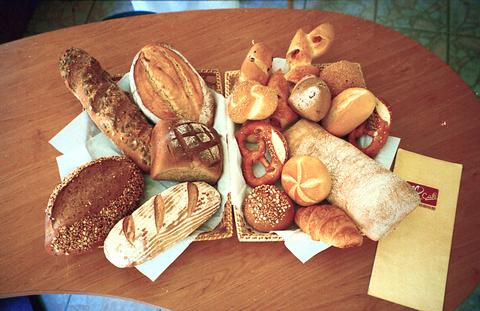Unlike many of Taipei's bakeries that fill their window displays with birthday cakes, breads of differing appearances and pastries of all shapes, the huge glass facade of the Wendel Backerei & Cafe reveals little of the expert baking that takes place within.
The German-style bakery is so unlike many of the city's more ostentatious bakeries in fact, that you could quite easily amble past without noticing it at all. That would be a shame if you enjoy baked goods.

PHOTO: GAVIN PHIPPS, TAIPEI TIMES
For the past two years, German national, Michael Wendel, has been baking up a smorgasbord of some of the most authentic Europe breads, including rye, grain, pumpkin and pumpernickel, rolls, cakes, pies and pretzels to be found in Taipei.
"I don't make my bread or cakes to suit local tastes," Wendel said. "I make sure they're all authentic." By authentic, Wendel means the breads aren't loaded with sugar and other sweeteners, which is one of the main reasons behind his bakery's popularity.
Wendel's store is also popular as a very reasonably-priced European-style bistro, offering diners a choice of savory German fare, such as smoked pork loin, roast chicken, Nurnberger sausage, Frankfurters, mashed potatoes and, of course, sauerkraut.
With set meals ranging in price from NT$110 to NT$260, dining at Wendel's certainly won't break the bank. What could give diners a dilemma, however, is choosing a dessert.
Along with such German staples as Black Forest cake, apple cake, Linzer torte and butter cake, there are countless other yummy pastries, pies and cakes to confound any sweet-toothed diner.
While there is little in the way of interior decor to the Wendel Backerei & Cafe, patrons are afforded a pleasant and airy environment in which to dine on simple and hearty German cuisine. The menu also includes several pasta dishes (NT$100 to NT$120) and submarine sandwiches (NT$90 to NT$110).
In addition to baking up a daily selection of rolls, breads and pastries, Wendel will prepare special breads and bulk orders on request -- should the ingredients be available.

April 14 to April 20 In March 1947, Sising Katadrepan urged the government to drop the “high mountain people” (高山族) designation for Indigenous Taiwanese and refer to them as “Taiwan people” (台灣族). He considered the term derogatory, arguing that it made them sound like animals. The Taiwan Provincial Government agreed to stop using the term, stating that Indigenous Taiwanese suffered all sorts of discrimination and oppression under the Japanese and were forced to live in the mountains as outsiders to society. Now, under the new regime, they would be seen as equals, thus they should be henceforth

Last week, the the National Immigration Agency (NIA) told the legislature that more than 10,000 naturalized Taiwanese citizens from the People’s Republic of China (PRC) risked having their citizenship revoked if they failed to provide proof that they had renounced their Chinese household registration within the next three months. Renunciation is required under the Act Governing Relations Between the People of the Taiwan Area and the Mainland Area (臺灣地區與大陸地區人民關係條例), as amended in 2004, though it was only a legal requirement after 2000. Prior to that, it had been only an administrative requirement since the Nationality Act (國籍法) was established in

Three big changes have transformed the landscape of Taiwan’s local patronage factions: Increasing Democratic Progressive Party (DPP) involvement, rising new factions and the Chinese Nationalist Party’s (KMT) significantly weakened control. GREEN FACTIONS It is said that “south of the Zhuoshui River (濁水溪), there is no blue-green divide,” meaning that from Yunlin County south there is no difference between KMT and DPP politicians. This is not always true, but there is more than a grain of truth to it. Traditionally, DPP factions are viewed as national entities, with their primary function to secure plum positions in the party and government. This is not unusual

US President Donald Trump’s bid to take back control of the Panama Canal has put his counterpart Jose Raul Mulino in a difficult position and revived fears in the Central American country that US military bases will return. After Trump vowed to reclaim the interoceanic waterway from Chinese influence, US Defense Secretary Pete Hegseth signed an agreement with the Mulino administration last week for the US to deploy troops in areas adjacent to the canal. For more than two decades, after handing over control of the strategically vital waterway to Panama in 1999 and dismantling the bases that protected it, Washington has